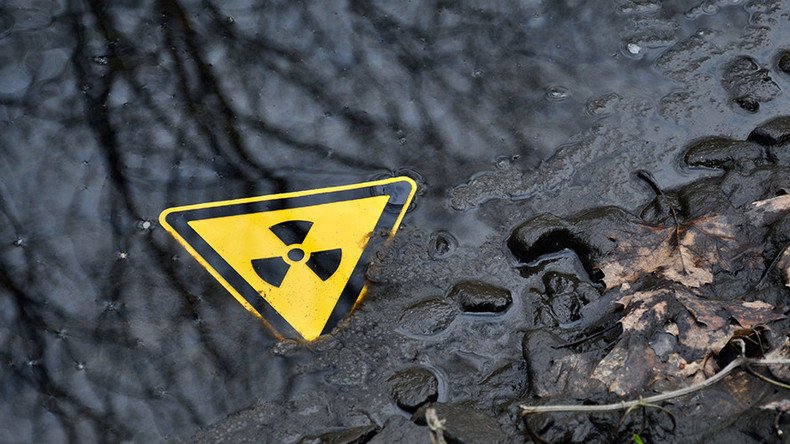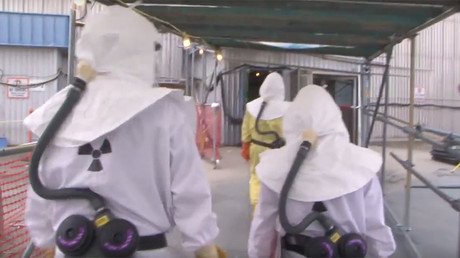Video shows workers at Hanford illegally dumping radioactive water

Investigators are looking into the Hanford nuclear facility in Washington state, after contractors were filmed dumping radiation-affected water and later tried to bury the evidence at the site of one of the largest nuclear cleanup efforts in the world.
Several videos obtained by Seattle’s KING-TV show workers at the Hanford facility’s Plutonium Finishing Plant (PFP) dumping liquids from large metal containers that are labeled “Caution: radioactive materials.”
Video shows illegal dumping of toxic liquids at Hanford https://t.co/hSnjje3jEdpic.twitter.com/6QfMyPuQQb
— KING 5 News (@KING5Seattle) October 27, 2017
“In nearly 25 years of working here I’ve never seen anything like that,” a Hanford worker told KING.
The workers are employed by Washington River Protection Solutions (WRPS), the organization responsible for cleaning approximately 53 million gallons of high-level radioactive and chemical waste stored in the containers at Hanford.
The facility dates back to the Manhattan Project in the 1940s. For decades, it produced the majority of the plutonium for the US nuclear weapons arsenal. In 1988, production stopped and the site became a burying ground for radioactive waste. Hanford has since become the most contaminated spot in the Western Hemisphere, prompting a multi-billion dollar clean-up process that isn’t expected to be completed until 2060.
“The soils under Hanford are extensively contaminated over a broad, broad area. The one thing you don’t want to do is create more waste sites,” said Dirk Dunning, a chemical engineer and Hanford expert.
WRPS told state investigators that workers dumped around 15 gallons of potentially toxic water on August 15 and 200 gallons on August 17, according to a document from the Department of Ecology.
Washington law makes it a gross misdemeanor to discharge pollutants into the water or soil. The company was also required to report any discharge of toxic waste to the Department of Ecology within 24 hours.
However, WRPS did not report the discharges for nearly a month, and a notification from the Department of Ecology shows the company only made the report days after KING emailed WRPS, federal and state officials, and the Environmental Crimes Unit of the state Office of the Attorney General about the incident.
“They knew it was wrong (to dump the liquids) but they did it anyway. They were hoping no one would question it. They definitely knew it should have been reported,” a WRPS employee said.
Hurricane-damaged nuclear plants in Texas & Florida need to be shut down - journalist @Solartopia [VIDEO] https://t.co/FjlGDqhxWt
— RT America (@RT_America) September 28, 2017
WRPS had been tasked with digging up 18 underground nuclear waste hoses and putting them in containers, which would then be buried in a nuclear waste dump at the facility. When workers found one of their containers filled with rainwater, they decided to dump it onto the ground rather than testing the water or transferring it to new containers.
A contract shows the company would earn $58,333 for each hose that was removed, for a total of more than $1 million dollars, if they finished the project by September 30.
WRPS dumped the toxic liquid in order to meet their deadline, said Tom Carpenter, executive director at Hanford Challenge, a watchdog organization working to keep contractors working at the facility accountable.
“They are here for the money and that’s it,” Carpenter told KING. “This fee structure ignores human nature, which is to take shortcuts to get the money without any accountability unless they get caught.”
The Department of Ecology has launched an investigation and has already been to the site to take soil samples to check for chemicals such as arsenic, lead and fluorene at the first dumping site.
However, after WRPS did a radiological survey and identified beta and gamma radioactive contamination, they removed the contaminated soil and surrounding debris, which can no longer be tested by investigators.
The disposal of radioactive waste at Hanford has been plagued with problems. RT visited the site last year, after workers were evacuated from the facility due to a leak of thousands of gallons of toxic waste. Locals said that the site occasionally “burps” radiation, which has led to a number of employees developing serious medical conditions over the years. In August, the company tested more than 300 workers, and found 20 percent tested positive for radiation contamination.
The Department of Energy estimates that 444 billion gallons of radioactive material and chemical waste were discharged onto the grounds of the facility and into the Columbia River in the first 50 years since the facility opened.
Dumping at the site without a permit became illegal after the nonprofit advocacy group Heart of America Northwest sued the Department of Energy in 1993.
After seeing the recent footage of workers dumping the toxic waste at the site, state Representative Gerry Pollet, who also serves as the executive director of Heart of America Northwest, called their actions “outrageous.”
“This is the kind of thing that caused Hanford to be the most contaminated place in the Western Hemisphere in the first place. I am shocked to see something like this in 2017,” Pollet said.
“It’s a crime. I’m convinced by looking at this that you’re witnessing a criminal violation of several statues, not just one.”














